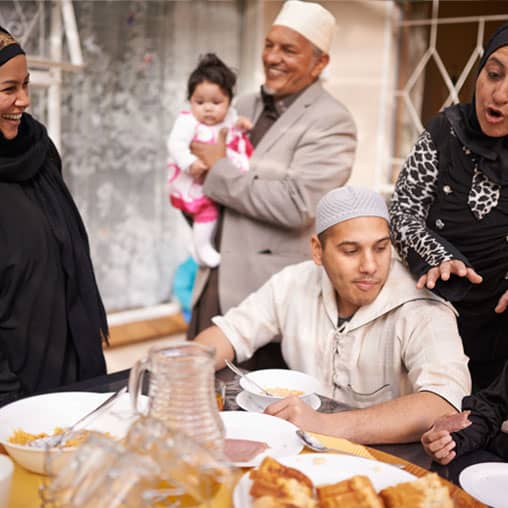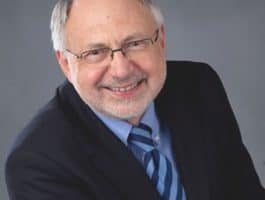
God at Work in the Middle East
Dr. Terence Ascott is founder of SAT-7, a Christian satellite television network broadcasting across 22 countries in the MIddle East. He talks about the amazing ways God has opened doors to present the gospel to those in the Middle East. Although much of the region is in chaos, Terence reports that more and more people are getting disheartened with Islam, and are turning to Christianity.
Show Notes
About the Host
About the Guest
-
Dr. Terence Ascott is founder of SAT-7, a Christian satellite television network broadcasting across 22 countries in the MIddle East. He talks about the amazing ways God has opened doors to present the gospel to those in the Middle East. Although much of the region is in chaos, Terence reports that more and more people are getting disheartened with Islam, and are turning to Christianity.
-
Dave and Ann Wilson
Dave and Ann Wilson are hosts of FamilyLife Today®, FamilyLife’s nationally-syndicated radio program. Dave and Ann have been married for more than 38 years and have spent the last 33 teaching and mentoring couples and parents across the country. They have been featured speakers at FamilyLife’s Weekend to Remember® marriage getaway since 1993 and have also hosted their own marriage conferences across the country. Cofounders of Kensington Church—a national, multicampus church that hosts more than 14,000 visitors every weekend—the Wilsons are the creative force behind DVD teaching series Rock Your Marriage and The Survival Guide To Parenting, as well as authors of the recently released book Vertical Marriage (Zondervan, 2019). Dave is a graduate of the International School of Theology, where he received a Master of Divinity degree. A Ball State University Hall of Fame quarterback, Dave served the Detroit Lions as chaplain for 33 years. Ann attended the University of Kentucky. She has been active alongside Dave in ministry as a speaker, writer, small-group leader, and mentor to countless wives of professional athletes. The Wilsons live in the Detroit area. They have three grown sons, CJ, Austin, and Cody, three daughters-in-law, and a growing number of grandchildren.
-

Barbara Rainey
After graduating from the University of Arkansas with a Bachelor of Arts degree in history, Barbara joined the staff of Cru® in 1971. With her husband Dennis, whom she married in 1972, the Rainey’s cofounded FamilyLife®, a ministry committed to helping marriages and families survive and thrive in our generation. Barbara is a frequent speaker and guest on FamilyLife Today®, FamilyLife’s award-winning nationally-syndicated daily radio broadcast. She is the author or coauthor of...more
Terence Ascott
Terence “Terry” Ascott has lived in the Middle East and served as the leader for indigenous media ministries for more than 40 years. In 1973 Terry moved to Beirut, Lebanon and worked to launch an Arabic Christian publishing ministry. After the start of the Lebanese Civil War, Terry and his family evacuated to Egypt. In Egypt Terry launched an Arabic youth magazine called “Magalla”. This was the first Christian magazine to be successfully distributed on newsstands, in more than a doze...more
Dr. Terence Ascott talks about the amazing ways God has opened doors to present the gospel in the Middle East. Terence reports that more and more people are leaving Islam, and are turning to Christianity.
God at Work in the Middle East
Bob: And welcome to FamilyLife Today. Thanks for joining us on the Thursday edition. It’s Thursday, December 3rd. Our host is the President of FamilyLife®, Dennis Rainey. I’m Bob Lepine. We’re taking some time this week to think about Christmas and to think globally. And if there is any area of the world that gets our attention on a regular basis, it’s the area we are going to focus on today—it’s the Middle East; right?
Dennis: It is. FamilyLife Today is all about reaching the world. We’re proclaiming Jesus Christ, here on FamilyLife Today, because family—listen to me—family is an international language. We have a ministry now that touches more than 109 countries around the world. Our radio broadcast is heard in about three dozen countries around the world as well.
And we are excited about being able to equip you and your marriage and family.
1:00
In fact, Bob, one of the things that I really enjoy getting is letters from kids who listen to FamilyLife Today.
Bob: Some of them under duress, but—[Laughter]
Dennis: Yes, exactly; you know? And I’m starting to meet some now who said, “I listened to you for years with my mom and dad.” I met a young lady—27 years old—the other day with her mom and dad. She wanted to meet me because—she said, “I listened to your broadcast as I was growing up. My mom and dad listened to it—I had to as well.” [Laughter]
And it’s always fun to get a letter from a kid—and I’ll never forget this one—he was from Seattle, as I recall. His mom and dad were not doing well. He came to his mom and said, “I’d like to send FamilyLife Today some money, here at the year’s end.” His mom said, “Why?” He said, “Because I want us to have a healthy family.”
And there is a long story to this, but the little boy sent about all the money he had. It turned out that we were able to send his parents to the Weekend to Remember®.
2:00
As I recall—Bob, you can correct me here—I believe his father received Christ at the Weekend to Remember. Their marriage was put back together, and it really was God at work in the life of a little boy who listened to FamilyLife Today who wanted to bring his parents back together.
Bob: We are asking our FamilyLife Today listeners to join us, here at yearend, and make a contribution in support of this ministry. We’ve got your wife, Barbara, joining us today. Barbara, this is something that you guys have done for years—you’re donors to FamilyLife.
Barbara: We are, and it’s been a great privilege. Dennis and I made a decision, years ago, that we wanted to donate the royalties from any book that we wrote to the ministry of FamilyLife because we so believe in helping families. Everyone has a family. Everyone wants a healthy family. Everyone wants a good marriage. And we’ve been about the business of helping that happen for people all over the United States and all over the world.
3:00
We’ve been grateful for the privilege of being donors, ourselves.
Bob: Did you ever wonder, when some of those royalty checks came in, and you looked at them and thought, “Boy, we could sure use…”
Barbara: Actually, I never saw the checks; but our kids knew that we did. Our kids—
Dennis: I would show them—I would show them some of the royalty checks.
Barbara: And the kids would go: “Dad! I want a different car than the one I’m driving. Couldn’t you please just keep one of them?” [Laughter]
Dennis: But it was fun to, really, do something that I’d seen my dad do, as a boy, as I grew up. Every Sunday—he was left-handed—he would curl that left hand with a pen in it. He would write out a check to the church—every Sunday. And that discipline of watching him give inspired me, along with others that I’ve rubbed shoulders with, to be generous and to participate with ministries that have meant a lot to us—have meant a lot to me and to Barbara as well.
So, it’s been a privilege to be able to give, not only the book royalties, but we’ve also written checks, ourselves, to FamilyLife Today.
4:00
We’re not challenging you to do something we don’t do; but if you like what we do here—if you believe the family needs to have a champion like FamilyLife Today talking about how to do marriage and family God’s way / according to the Scripture, then, pick up a phone, or go online, or write a check and send a little note along with it. Usually, those notes make our day—we don’t get all that many letters anymore. It’s fun to see a letter from a listener who wants to keep us on the air.
Bob: And when you make a donation right now—between now and the end of the year—we’ve had some friends of the ministry, who have agreed that, for every dollar you contribute, they’re going to contribute two dollars. So, every dollar becomes three when you support FamilyLife Today between now and the end of the year. You make a $100 donation—it’s a $300 donation to FamilyLife. And it’s easy to donate. You can do it, online, at FamilyLifeToday.com; or you can call 1-800-FL-TODAY—
5:00
—donate over the phone. Or if you’d like to mail a note and include a check, send it to FamilyLife Today at PO Box 7111, Little Rock, AR; and our zip code is 72223.
And I was talking about the Middle East a few minutes ago. One of the reasons it was on my heart and on my mind is because I was looking at one of the Christmas tree ornaments that you’ve created, Barbara—a new set of what you call Adorenaments®. These are in different languages. One of the languages that you’ve chosen for your Christmas tree ornaments is Arabic.
Barbara: It is Arabic. Arabic is a language that is increasingly spoken in the Middle East—it’s not just in one country / it’s over that whole region. We are all confronted with news out of that part of the world on a pretty regular basis. I felt like it would be helpful for us to be reminded, at Christmas, that Jesus came for those people. In fact, he was born in the Middle East.
6:00
So, focusing on the Arabic-speaking peoples is a way to remind ourselves that, even though there are a lot of bad things happening in that part of the world, Jesus came to redeem those people and those families and to give them hope. I think seeing that name—seeing Jesus written in Arabic—will be a great reminder and even a prompt for many families to pray for that part of the world.
Bob: Arabic, of course, is the language of Islam. If you were sitting down with your young kids today, and they’ve seen on the news things coming out of the Middle East, how would you explain to your children how we ought to respond to what we see and what we hear on TV?
Dennis: Well, “There are bad folks in every language—I mean, men/women, who do evil things—who hurt innocent people.” I think our children need to be reminded of what the Bible teaches.
7:00
Barbara: —which is—Jesus told us that we are to love those who persecute us, and to love our enemies, and to do good to them. And on the back of each of the ornaments that we have created this—so, on the back on the ornament that has Jesus in Arabic on the front, are some suggestions for how to pray for Arabic-speaking people. So, it’s a way to be involved. It’s a way to be engage even though we are distant, geographically, from most Arabic-speaking people.
Dennis: And I think most of our children are going to know what an enemy is. They’re going to have people at school who are not their friends—who are mean to them—and they need to be trained in how to love / how to pray for those who don’t agree with them.
Bob: Well, keep in mind—we have a lot of brothers and sisters in Christ, who are Arabic-speaking people, who live—
Barbara: That’s right.
Bob: —in the Middle East. In fact, right now, in the Middle East, God is at work.
Barbara: Yes, He is.
Bob: There is some pretty significant stuff happening. We have on the line with us, from Cyprus, Dr. Terry Ascott—
8:00
—who is the Chief Executive Officer of SAT-7. Terry welcome to FamilyLife Today.
Terry: Thank you. Thank you for having me.
Bob: Explain what you are doing in the Arab world.
Terry: Well, we are using the amazing opportunity of uncensored television to go into, literally, millions of homes across the whole western end of what some people call the 10/40 Window—from Morocco to Afghanistan. We’re broadcasting in the three big languages of the region—Arabic / there are about 360 million people who speak Arabic—and in Turkish / about 100 million people speak a Turkic language—and in Farsi or Persian / another 100 million speak Persian, or Dari, or some dialect of Farsi.
It’s an awesome opportunity. These are countries where traditional forms of Christian witness have been stifled or extinguished in many cases. Over two-thirds of the population have satellite television at home and can receive uncensored news and information through a medium that really has become the trusted source of information.
9:00
So, it is quite an amazing opportunity that we’ve got in these days.
Dennis: I detect by your accent that you’re not from the South, here in the United States. [Laughter] You are in Cyprus, but—well, explain to our listeners where you came from and how in the world you ended up there, doing what you’re doing.
Terry: Yes. Well, that’s interesting. I’m from London. I grew up in a home that really did not have any respect for the church—and certainly Jesus was never mentioned—but became a believer in my mid-teens. I went on to study civil engineering; but at the same time, got very involved with a group called Operation Mobilization and spent summers in Europe, witnessing for my faith. [I] became very interested in Christian publishing and was heavily involved in publishing material for students during the days of the revolutions in Europe in the late ‘60s.
10:00
But I was also asked to go to Beirut to help with a publishing project there just because I had some experience in Christian publishing. I went there in 1972 just a few weeks after getting married and—
Dennis: Now, wait a second! You took your new bride, on your honeymoon, to Beirut, Lebanon?
Terry: Well, I did take her through Eastern Europe first. [Laughter]
Barbara: That makes it better. [Laughter]
Dennis: You really are a man of great faith.
Terry: A man who is paying the price for having done that for years. [Laughter]
Dennis: She’s reminded you of that—that’s why you live in Cyprus now; right?
Terry: Yes. And so, I mean—when I got to Lebanon, the needs and the opportunities were so great. I just felt, “This is much more important than structural design and British buildings,” which I was involved in at that time.
11:00
Really, that was 42/43 years ago. I just haven’t regretted that decision to stay on in the Middle East.
Barbara: Wow.
Bob: There are people who strongly oppose what you’re doing and would love to see SAT-7 shut down. In fact, you have been personally at risk for what you’re doing. Your life has been threatened; right?
Terry: It has. I’ve been deported from Egypt in the past, and we’ve had an arson attack on one of our studios in the Middle East in the past. But generally, governments have been pretty tolerant of us for two reasons: One, we never attack on the beliefs of Islam; and we don’t get into politics. We only present the Christian faith in a positive way.
Through that respect for other people’s belief systems—and yet an uncompromising but sensitive, comprehensive presentation of the gospel—we’ve been able to win a lot of sympathy in the region.
12:00
We have good cooperation from the government in Egypt, in Jordan, in Lebanon, in Turkey. Even though it’s overtly/clearly boldly Christian in presenting the gospel, it is sensitive and doesn’t unnecessarily offend. You know, the cross will always be a stumbling block or an offense to some; but sometimes, when we come at this, we make it unnecessarily offensive.
Barbara: I would like to know—and I think our listeners would also like to know—those who are coming to Christ in the Middle East in those language groups that you have SAT-7 broadcast in, what did they do to celebrate Christmas? What do they do, as a family? Since your broadcasts are going into homes, how do they receive that message; and then, do they, in fact, celebrate Christmas as a result of becoming believers?
Terry: Yes. Well, that’s quite a complex question—[Laughter]—
13:00
—because we’re dealing with many countries and many cultures;—
Barbara: Sure.
Terry: —but essentially, we have—first problem we have is two Christmases. The Orthodox, and the Coptic Orthodox, and the Armenians—they celebrate Christmas around the 6th and 7th of January.
Barbara: January, yes.
Terry: Western and Catholic churches, they tend to celebrate it, as we do, on the 25th of December. So, we have a very long Christmas schedule, where we provide Christmas and worship services on both days. So, Christmas goes on for quite a long time.
Jesus is a recognized prophet in Islam. His birth was recognized as a miracle. So, our programming is very orientated to explaining the real meaning of Christmas and sort of shaking off the idea that it’s all about Santa Claus and gifts, which has permeated through Western films that are coming to the region. You go into the shopping mall in Dubai.
14:00
There is Father Christmas, larger than life, and Christmas music in an Islamic context; but it’s not really anything about Jesus.
Dennis: Terry, beginning last summer, we began to see these images on television, back here in the States, of these refugees—millions upon millions—fleeing countries. I would just like to know your perspective of what’s happening. If you have a word that you’d like to speak to followers of Christ back here—in terms of what our responsibility is toward these people—I mean, we are separated by an ocean; but the cross calls us to go to the world.
Terry: Yes. I mean, there are obvious needs—humanitarian needs.
What we’re trying to do through the broadcast is—as much as we can—I mean, we are having interviews with people—with profiling Christians who have forgiven Muslims who have killed their families / destroyed their churches.
15:00
There are some wonderful stories out there on the internet. And this response to violence by Christians or nonresponse, if you like, has made a profound impact on many people as they see Christians breaking the cycle of violence.
We’re also working on starting a separate channel just for displaced children who are out of school. There are actually 15 million Arabic-speaking kids who are not in school. Of course, many of these are refugees from Syria or internally-displaced people who’ve been displaced from their schools and their homes. We started—actually, last March—to broadcast four-and-a-half hours a day of basic schooling in Arabic, in English, and mathematics for this potentially-lost generation.
Dennis: Wow.
Terry: And of course, we are working to encourage Christians and Christian leaders in the area, who are facing a very difficult choice—
16:00
—do they encourage their flocks to leave and seek refuge in the West, and give up on their homeland, or do these pastors encourage their flock to stay and face possibly increased difficulties? We still have got a lot of Christians in Syria, who’ve not been displaced by ISIS, who are in government-controlled areas; but how much longer will they be willing to stay and take the risk of an overrun by some Islamic group in the near future?
It’s a very difficult and very moving situation at the moment; but in this, of course, is a great opportunity to show the love of Jesus—to be the hands and the feet of Jesus—and to reach out and support these communities.
Dennis: Well, it’s been our privilege today to talk to Terry Ascott, who is living in Cyprus—has a ministry all over the Middle East through SAT-7.
17:00
Terry, I just want to thank you, again, for taking this time out, after travelling for three weeks, to stay up at night as we do this broadcast and share what God is doing. I just want to commend you for just who you are / your steps of faith. There’s a lot more I’d like to ask you—I may have to get on the phone with you at some other time and have a conversation with you.
But Terry, I have a favorite question I like to ask people on occasion that I’d like to hear your answer to—and it’s a pretty simple question—I’ll unpack it a bit after I ask it. I like to ask people: “What is the most courageous thing you’ve ever done in all your life?”
I’m looking at you, and I’m thinking of over 40 years of living by faith—going to Beirut, living on the edge of danger in the Middle East, doing what you’ve done for a lifetime—and I’m giving you time, Terry / I’m stalling a bit here so you can answer—
18:00
—but the definition of courage is: “Doing your duty in the face of fear.” Now, I’ll ask you the question: “Terry Ascott, what’s the most courageous thing you’ve ever done in all your life?”
Terry: Well, I never went looking for dangerous situations, even though I’ve been through them. So, I can’t say I was courageous. I just—they came upon me, and I dealt with them; okay? Being courageous, I guess, is actually deliberately stepping into a situation, where you know there is a risk of some kind. And I suppose, actually, the most courageous was pressing on with the idea and the vision of SAT-7.
In those early days, we actually had the offer from a foundation in the US—who I won’t name so I don’t embarrass them—but it’s a well-known foundation. They took some of us from Egypt and other countries to a consultation in Atlanta, where we spent two days going through the business plan, and the model, and what we wanted to do.
19:00
Their conclusion at the end of it—they supported the feasibility studies—their conclusion was: “This is not a feasible project. It’s not sustainable. So, we’re not going to support you.”
That was really the low point for many of us when they said that. But we just felt this was too great an opportunity—that we had to press on with it. We thank God for all the staff He’s raised up in this process and the resources that have been brought to the table, but it is an amazing story of God’s provision.
I suppose, for me, it was leaving my previous ministry responsibilities and stepping into the new role of CEO and Founder of SAT-7 that was probably the most courageous thing I had to do because it was, apparently according to the experts, impossible. [Laughter]
Dennis: Well, I will share with you a quote that I’ve mentioned many times, here on FamilyLife Today, and to many audiences around the country—
20:00
—it’s by A. W. Tozer.
Terry: Yes?
Dennis: He said: “God is looking for people through whom He can do the impossible. What a pity we plan to do the things we can only do by ourselves.”
Terry: Amen.
Dennis: And Terry Ascott, you are a man that has done the impossible. I just want to applaud your courage / your faithfulness. I stand in awe.
Terry: Well, thank you; but really, I haven’t done the impossible. I just stood back and watched God do the impossible.
Barbara: Let God do it. [Laughter]
Dennis: Well, we all know who did it; but He uses clay pots, Terry.
Bob: Thanks for the time today—
Dennis: Yes.
Bob: —and get a good night’s sleep.
Terry: Thank you—will do.
Barbara: Thank you.
Dennis: We’ll say—
Terry: Bye.
Dennis: Bye-bye.
Barbara: Bye.
Bob: What a great privilege.
Dennis: I want to meet him someday.
Bob: Yes.
Barbara: Yes, I do too.
Dennis: I think I’ll go to Cyprus. [Laughter]
Bob: Well, and just to hear how God’s at work and to know that we have brothers and sisters who are—
21:00
—not only working to share the gospel—but new brothers and sisters who are coming to faith, every day, in the Middle East.
Dennis: And if your kids didn’t hear this broadcast, play it for them! Talk about the world and talk about how the world needs dreamers—men and women who think about what God can do and how God can use them. This is the season to be talking about God with us—the God-man who dwelt among us in the person of Jesus Christ—and showed God off to the world.
Bob: Well, and when you are able to get out five ornaments to hang on the Christmas tree—and one of them is in Spanish, and one of them is in Mandarin, and one of them is in Arabic, and one is in Hebrew, and one is in Russian—and your kids look at it and say, “What does that one say?” You say, “Well, that one says, ‘Jesus.’” “Well, what does this one say?” “That one says, ‘Jesus.’” They’re going to get the idea that this is what the holiday is all about, and these are the people for whom Christ died.
Dennis: And if you get the other 21 Adorenaments—
22:00
—the “Christmas Names of Christ,” the “Royal Names of Christ,” and the “Savior Names of Christ”—you’re going to have a Christmas tree that just—it just screams about who the Savior is and what He came to do.
Bob: If you hang a reindeer on that tree, it’ll look out of place. [Laughter]
Dennis: Oh, yes! I can’t wait—I can’t wait to get a letter from somebody: “I took my reindeer down.” [Laughter]
Bob: You can go to our website, FamilyLifeToday.com, and you can see the ornaments that Barbara has created. Look for the link for Ever Thine Home® or the link that says, “Today’s Resources.” All that you need is available right there. Again, the website, FamilyLifeToday.com—you can order from us online. Or you can call 1-800-FL-TODAY—1-800-358-6329. That’s 1-800-“F” as in family, “L” as in life, and then, the word, “TODAY.” Ask about the Christmas ornaments—the Adorenaments collection. We’ll let you know how you can have them sent to you.
23:00
And then, quickly, let me, again, remind those of you who are regular FamilyLife Today listeners—if you have thought, at all, about making a yearend contribution in support of ministries like FamilyLife Today, can we encourage you to do that today? We’ve had some friends who are making a matching gift available to this ministry. Any donation we receive, during the month of December, they are going to match whatever amount you give with a donation of their own that is twice as much as the donation you made. So, if you give a $100 donation, they are going to give another $200—FamilyLife will be the beneficiary of a $300 donation.
We hope to take full advantage of this matching-gift opportunity. The cap they’ve put on it is $2 million; so, we’ve got a ways to go. We’re asking you to make a donation today. Go to FamilyLifeToday.com to donate online; or call 1-800-FL-TODAY—make your donation over the phone—or if you’d like to mail your donation, our address is FamilyLife Today, PO Box 7111, Little Rock, AR; the zip code is 72223.
24:00
Now, tomorrow, we’re going to find out more about how Christmas is celebrated in the land where Jesus lived. We’re going to talk to a friend of ours who lives just outside of Tel Aviv and hear about Christmas in the Holy Land. Hope you can tune in for that.
I want to thank our engineer today, Keith Lynch, along with our entire broadcast production team. On behalf of our host, Dennis Rainey, I’m Bob Lepine. We will see you back tomorrow for another edition of FamilyLife Today.
FamilyLife Today is a production of FamilyLife of Little Rock, Arkansas.
Help for today. Hope for tomorrow.
We are so happy to provide these transcripts to you. However, there is a cost to produce them for our website. If you’ve benefited from the broadcast transcripts, would you consider donating today to help defray the costs?
Copyright © 2015 FamilyLife. All rights reserved.
1





